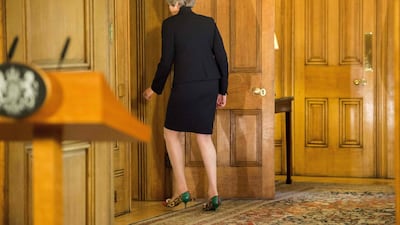When she became Britain’s second woman prime minister in 2017, Theresa May was asked to describe the naughtiest thing she ever did. After a pause, she decided it was when she used to “run through fields of wheat”, much to the displeasure of local farmers. For the British media, this admission confirmed Mrs May as a dull goody-goody, a prim head-girl figure. She has also been described by her Conservative party colleague Kenneth Clarke as a “bloody difficult woman” who revels in her own stubbornness.
These two aspects of Mrs May’s character are important in understanding the parlous state of Britain, now six months away from leaving the European Union, in March 2019. Brexit is by far the naughtiest thing any British prime minister has attempted in living memory. Mrs May originally opposed Brexit, yet is now, stubbornly and incompetently, intent on delivering something she never wanted in the first place. The result is a humiliating mess.
Compared to the dislocation Brexit will cause, Britain’s first female prime minister Margaret Thatcher was a modest reformer. Thatcher was both loved and loathed, but she was also an undeniable achiever. She destroyed the power of trades unions, emasculated the opposition Labour party, helped bring down Communism, privatised state industries, fought a difficult war in the South Atlantic and secured an enormous rebate from what is now the European Union. In all of this, she planned carefully and moved slowly. She assembled allies and only then acted ruthlessly to achieve clear goals.
Mrs May has done the opposite. She unwisely set a timetable for leaving the EU by March 2019 without a plan. She failed to assemble true allies and failed to explain convincingly what leaving would mean. There is a proposal, agreed by the cabinet at Chequers, the UK prime minister’s country house, in July. But the Chequers plan has been rejected by the EU, and it isn’t even agreed across all of Mrs May’s own Conservative party. Some hate it. Prominent government members quit. One rival who stayed, Michael Gove, now claims the Chequers plan is not the end, but the beginning of interminable wrangling with the EU. Where Mrs Thatcher was feared and respected even by enemies, Mrs May is laughed at and pitied, even by friends.
Six months before Brexit, an increasingly disunited UK is led by a prime minister who cannot be strong abroad because she is profoundly weak at home. Her most disastrous error was to force an unnecessary general election in 2017, because she wanted a personal mandate to secure a deal with Brussels promising “strong and stable government”. She failed in this aim, losing votes, seats in parliament and credibility.
Britain is now limping towards its most momentous change for generations, with a weak, precarious government and a leader who cannot lead effectively. Some major businesses are now considering leaving the UK – a country that used to be considered the best in Europe to do business in. Others, such as the car manufacturers BMW and Jaguar Land Rover, have moved their annual factory shutdowns to mitigate parts shortages caused by Brexit or announced short-time working.
Given just 10 minutes to plead for concessions that will not be made, Mrs May was humiliated at a meeting of EU leaders in Salzburg, Austria, last week. The next day, she fired back at Brussels in a hurriedly arranged Downing Street statement. Perhaps she will, by some miracle, be able to strike a deal with the EU, but then she has to win a vote in the House of Commons. Even on her own side, many think she has made too many concessions already.
The result could be that the May government collapses, followed by a divisive general election. Alternatively, Mrs May could announce a People’s Vote − a referendum on any Brexit deal. Increasing numbers of non-partisan observers (including me) think this is the best way forward. Many politicians are considering this option seriously, perhaps seeking to extend the timetable for withdrawal beyond March 2019.
But Mrs May is stubborn. Even if a People’s Vote could get her out of the mess she is in, she will undoubtedly persist in her failing course until forced to do otherwise. And then? Well, even with an orderly exit from the European Union, Mrs May’s legacy will be a divided, disconsolate country, poorer than it need be, regarded as incompetent by our friends, and forced to seek favour with the Trump administration and other unreliable allies. As the former US Secretary of State Colin Powell once said: “If you break it, you own it.”
When – or if – Britain leaves the EU, the blame for anything that goes wrong in the country’s economy or culture will be laid at the door of Mrs May and her party. The dismal forecasts include a brain drain, significant inflation, house prices falling, rising unemployment, skills shortages, trade disruption, social disorder, a run on the currency, plus banking, insurance and other bureaucratic problems.
Of course, if a Conservative Brexit leads Britain to a land of milk and honey, the party will prosper along with the country. But the risks posed by Brexit are enormous. Instead of a field of wheat, Mrs May is now running through a minefield.
Gavin Esler is a journalist, author and television presenter


